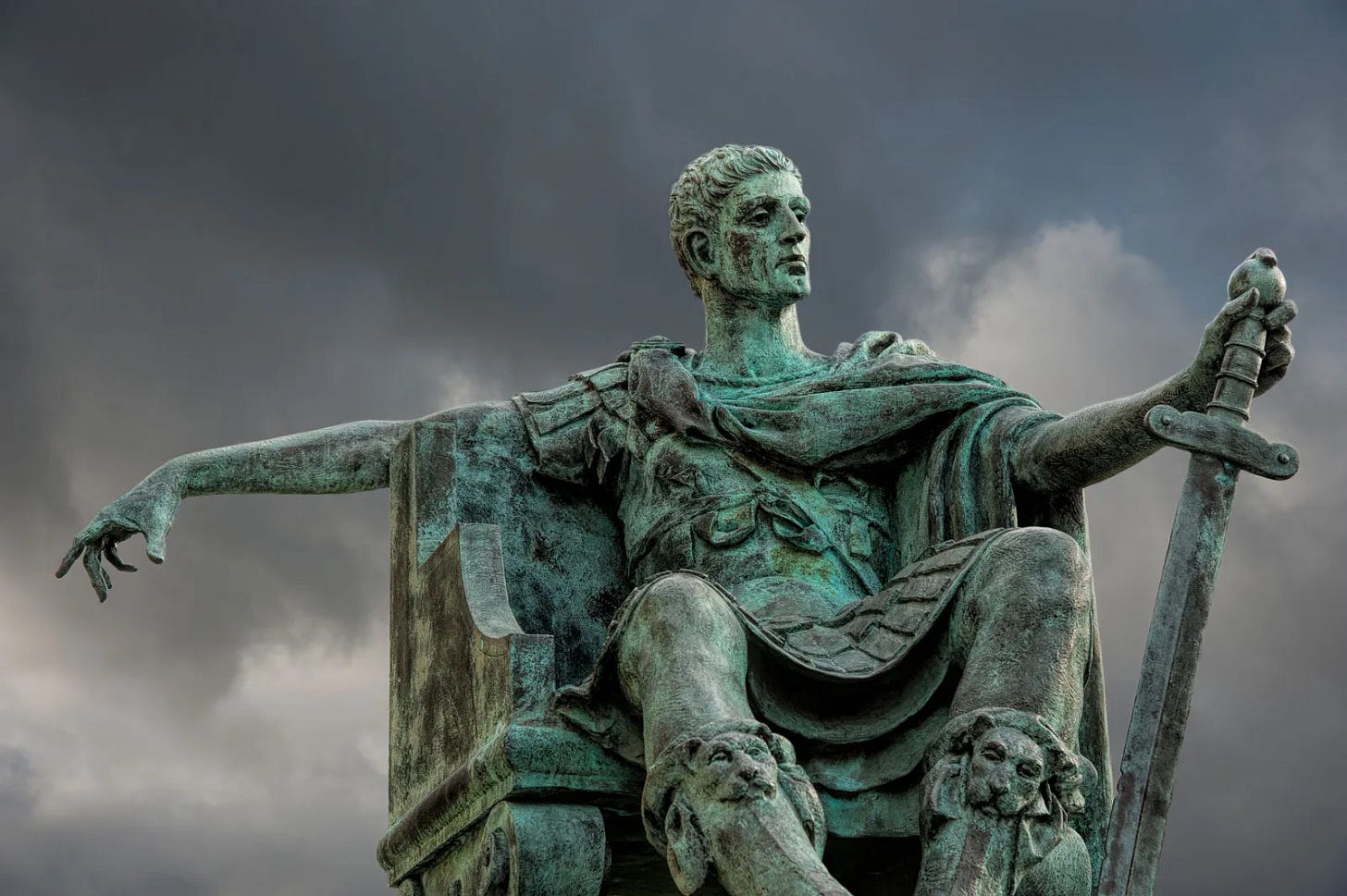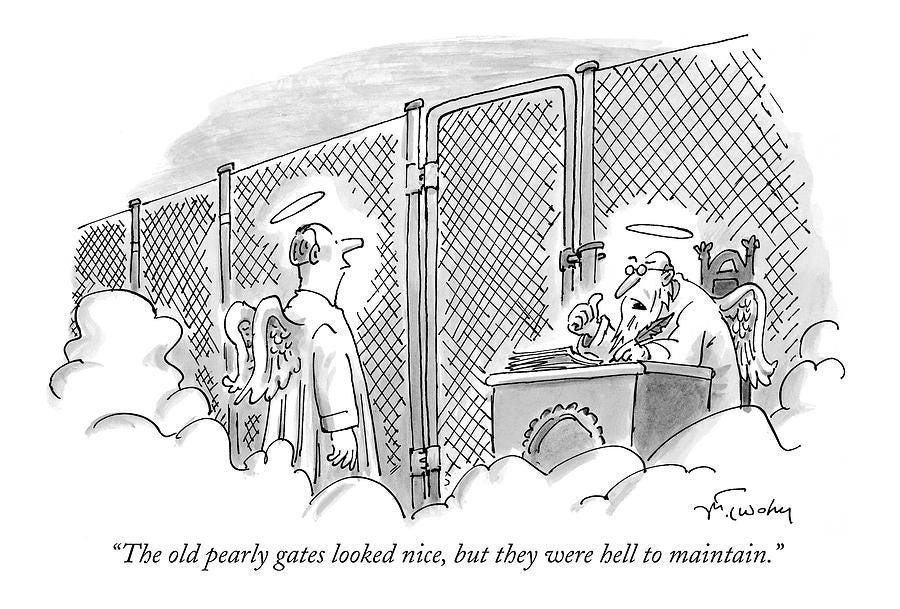This is part II reclaiming the word FAITH. To read part I
How Faith Became a System
So how did we get from faith working through love to faith as mental agreement? From an embodied, communal way of living to a checklist of beliefs you’re supposed to affirm?
The answer isn’t a single moment, but a long, slow drift—accelerated by key turning points in Christian history that gradually shifted faith from practice to proposition, from obedience to orthodoxy.
For brevity’s sake, I’ll compress centuries of complexity into a few critical snapshots.
Constantine and the Imperial Turn
When the Roman Emperor Constantine legalized Christianity in the 4th century, the once-persecuted movement of Jesus-followers became entangled with political power. What had been a subversive, communal way of life—marked by enemy love, shared meals, and a refusal to call Caesar Lord—suddenly became safe, official, even patriotic.
With empire came the need for control and cohesion. Faith had to be defined, codified, and enforced. Creeds like the Nicene Creed were not merely theological clarifications; they became tools of imperial consolidation—drawing sharp boundaries around belief in order to stabilize the Church within the machinery of state power. Orthodoxy shifted from a way of following Jesus to a checklist of statements about him.
Scholasticism and the Rise of Intellectual Theology
In the medieval period, theology moved into the university. Faith, once rooted in community and practice, was increasingly treated as an academic discipline—something to be systematized, debated, and defined. As scholasticism took hold, Christian belief became a matter of intellectual precision.
Brilliant thinkers like Thomas Aquinas built intricate theological frameworks, weaving philosophy and doctrine into dazzling synthesis. But in the process, faith was gradually reimagined—not as a way of life to be embodied, but as a set of propositions to be understood.
Salvation became a legal puzzle to solve. Grace became a term to classify. And faith increasingly meant holding the correct ideas: What do you believe about God? What’s your doctrinal position on X?
The Reformation and the Individualized Gospel
The Protestant Reformation rightly challenged the corruption of works-based salvation. But in pushing back against institutional control, many reformers swung hard in the other direction. Faith became primarily internal—personal, private, and invisible. The central question was no longer How are you living? but Have you placed your trust in Jesus Christ as your personal Lord and Savior?
This language was revolutionary in its time. It liberated ordinary people from the manipulations of clerical power and emphasized the immediacy of grace. But over the centuries, it also helped create a version of Christianity where faith resided in the head and heart—but not always in the hands. Discipleship became a matter of belief, not practice; affirmation, not embodiment.
(Of course there were movements, like the Anabaptist that resisted this privatization—insisting that faith must shape both personal piety and public life.)
Modern Evangelicalism and the Sinner’s Prayer
In the American revivalist tradition, the inward turn of faith accelerated. Faith became something you could decide in a single moment—often sealed with a “sinner’s prayer,” a kind of verbal contract with God. Churches began to ask, “Do you know where you’ll go when you die?” instead of, “How are you living now—and who are you living for?”
To be clear, none of this is entirely wrong. Many people have experienced real transformation through these expressions of faith. But when faith is reduced to a moment of mental agreement or a private transaction, it loses its teeth. It loses its witness. It loses its power to confront injustice or reimagine the world.
And that’s where we find ourselves now: in a culture where being a Christian often means believing a few things about Jesus—but not necessarily living like him, or voting like him.
The Faithful Community: Set Apart, Not Set Above
If modern Christianity has tended to shrink faith down to a private belief or a personal moment, then one of the most radical things the early church did was live faith out loud—together.
Faith, for the earliest followers of Jesus, wasn’t just about individual trust. It was about belonging to a community that embodied a different story, practiced a different economy, and worshiped a different king. That’s what it meant to be holy—not pious or perfect, but set apart. Not floating above society, but rooted within it in a way that exposed the injustice of the systems around them.
The New Testament writers knew this. They didn’t write theology textbooks. They wrote letters to communities struggling to live differently. Communities that refused to offer incense to Caesar. That practiced radical generosity. That broke bread with slaves and landowners at the same table. That welcomed women as leaders and prophets. That refused to let nationality, gender, or class determine belonging.
“They devoted themselves to the apostles’ teaching and fellowship, to the breaking of bread and the prayers… All who believed were together and had all things in common.” Acts 2:42, 44
This kind of living was not just beautiful—it was dangerous. Because it revealed another kingdom. It was a direct challenge to Rome’s imagination of order, power, and value.
And that’s what made the early Christians a threat. Not their beliefs about the Trinity. Not their views on atonement. But their refusal to play by Caesar’s rules: They wouldn’t join in the sacrifice economy. They wouldn’t pledge allegiance to the imperial cult. They wouldn’t abandon the poor, or justify injustice, or keep silent.
And for that, they were persecuted. Not because they believed something strange—but because they lived something different.
Caesar’s Values vs. Christ’s Way
To recover faith as something embodied and communal, we also have to be honest about what we’re embodying—and what we’re resisting.
Faith is never lived in a vacuum. It always takes shape within a particular culture, set against the backdrop of dominant values. In the time of Jesus and the early church, that backdrop was Rome. Today, it goes by other names: consumerism, nationalism, individualism, prosperity. But the engine is the same. Whether wrapped in a toga or a flag, empire runs on commodification, extraction, fear, and spectacle.
Luke begins Jesus’ story with a telling detail: “In those days a decree went out from Emperor Augustus that all the world should be registered.” (Luke 2:1) It wasn’t a neutral headcount. The census was for taxation—and for identifying who could be conscripted into the Emperor’s wars. That’s the logic of empire. Allow me to articulate these values quickly and plainly.
Commodification
Empire teaches us to see people and creation as things to be used. Value is measured by productivity, profitability, or social utility. The elderly, the disabled, the unemployed—anyone not producing—is quietly discarded. Anyone protesting is silenced. But Jesus didn’t welcome people because they were useful. He welcomed them because they were human. In his kingdom, worth isn’t earned—it’s inherent.
Extraction
Empire thrives by taking—from the land, from laborers, from the poor, from neighboring nations. Resources exist for profit. People are measured by output. The world is treated as raw material.
But Jesus doesn’t extract—he gives. He feeds the hungry instead of taxing them. He tells stories of planting and pruning, not strip-mining and stockpiling. He offers abundance through shared bread and mutual care, not through control or conquest.
Militarism and Hierarchy
Empire maintains control through force and fear—through soldiers in the streets and crosses on hillsides. Power flows from the top down. The strong win; the weak are crushed. But Jesus refuses the sword. He tells Peter to put it away. He redefines greatness as servanthood and kingship as self-giving love. His triumph is not a military parade but a donkey ride amid people crying out Hosanna - save us.
Performative Piety
Empire loves religion. Constantine figured this out. Religion is a great tool as long as it stays tame. It loves prayers at football games, flags in sanctuaries, and chaplains who bless the market. But don’t ask questions. Don’t name injustice. Don’t disrupt the order. But Jesus does. He calls out hypocrisy more than any other sin. He flips tables in the temple. He warns against public prayer that masks private greed. He insists that true faith is not performance, but practice.
This is the world the early church stood against. Not by overthrowing Caesar with violence, but by quietly embodying a different way. A different allegiance. A different economy. And that’s what makes the modern distortion of faith so tragic. Because too often, what we now call Christianity has absorbed these imperial values instead of resisting them. We preach personal salvation but ignore systemic injustice. We say the right words but uphold the wrong kingdoms. We bless greed, baptize nationalism, and build churches that look more like shopping malls than sanctuaries.
When Empire Enters the Sanctuary
The danger of empire has never been that it destroys the church from the outside. It’s that it quietly reshapes the church from within. And you don’t need a Roman centurion at the altar to see it. You just need a culture that treats the church as a commodity, not a community.
We “go to church” the way we go to a gym or a coffee shop. We even have a term for it: church shopping. We compare features and aesthetics. Which one matches our theology? Which one has the music we like? The right vibe? dynamic preacher? A solid “brand”? And programs, programs, programs: Do they have a youth group? Vacation Bible School in the summer? Parenting classes? A grief support group? Choir? A praise band? Food pantry? Book club? A mission trip to Central America? A Christmas pageant with live animals? How’s their coffee?
We choose churches based on consumer preference, not covenant belonging. And pastors, under pressure to compete in the religious marketplace, build churches that offer programs instead of discipleship—and rarely, if ever, form the kind of communities that stand as a stark alternative to the values of empire. We offer services, not solidarity.
All the while, the values of Caesar quietly pass for wisdom. We measure faithfulness by attendance and giving, rather than justice and mercy or the impact church makes in the community. We stay silent in the face of oppression, afraid to offend donors or disrupt comfort.
We speak endlessly about heaven while neglecting Jesus’ central prayer: “Your kingdom come, your will be done, on earth as it is in heaven.”
Faith becomes a ticket to the afterlife, not a call to take up your cross in this one. Absorbing the pace of life dictated by the pressures of success we pass by the wounded on the road because we are in such a hurry to get to Jericho.
Jesus says the one who did the will of God was not the priest or the Levite who certainly believed the right things. It was the outsider. The heretic. The Samaritan who acted. Who poured out his life because of how he lived in the presence of suffering.
This is the kind of faith the church was meant to embody. Not a curated experience, but a cruciform community. Not a market for spiritual goods or self improvement, but a movement of love and resistance. Not a place to be served, but a people who serve.
We have been convinced that church is a place you go when in fact the church is something that you are, something you practice, in which you participate. Until we reclaim this vision—until we see faith as something lived rather than possessed—we will continue to bless empire while calling it Christianity.
But there is another way. A deeper way. A harder and more beautiful way. The way of faith that sees the world as Jesus sees it, that trusts the promises of God, and that lives as if the kingdom is already breaking in…Because it is.
And the discipline—the daily, embodied, communal practice—to give the kingdom of God priority is hard. The commitment to pursue those values - That’s faith.
Not just belief in Jesus, but the way of Jesus.
Not just an inner conviction, but the discipline of discipleship.
The courage to see the world differently, to trust differently, and to live differently.
That’s the kind of faith that calls us to reclaim the word.










